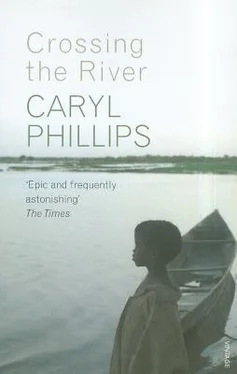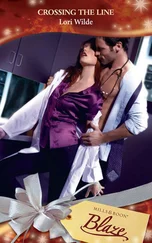Caryl Phillips - Crossing the River
Здесь есть возможность читать онлайн «Caryl Phillips - Crossing the River» весь текст электронной книги совершенно бесплатно (целиком полную версию без сокращений). В некоторых случаях можно слушать аудио, скачать через торрент в формате fb2 и присутствует краткое содержание. Год выпуска: 2006, Издательство: Vintage, Жанр: Современная проза, на английском языке. Описание произведения, (предисловие) а так же отзывы посетителей доступны на портале библиотеки ЛибКат.
- Название:Crossing the River
- Автор:
- Издательство:Vintage
- Жанр:
- Год:2006
- ISBN:нет данных
- Рейтинг книги:4 / 5. Голосов: 1
-
Избранное:Добавить в избранное
- Отзывы:
-
Ваша оценка:
- 80
- 1
- 2
- 3
- 4
- 5
Crossing the River: краткое содержание, описание и аннотация
Предлагаем к чтению аннотацию, описание, краткое содержание или предисловие (зависит от того, что написал сам автор книги «Crossing the River»). Если вы не нашли необходимую информацию о книге — напишите в комментариях, мы постараемся отыскать её.
Crossing the River — читать онлайн бесплатно полную книгу (весь текст) целиком
Ниже представлен текст книги, разбитый по страницам. Система сохранения места последней прочитанной страницы, позволяет с удобством читать онлайн бесплатно книгу «Crossing the River», без необходимости каждый раз заново искать на чём Вы остановились. Поставьте закладку, и сможете в любой момент перейти на страницу, на которой закончили чтение.
Интервал:
Закладка:
There used to be four of them when they last came up the trail. I don’t remember the fourth man, but I know that there used to be a fourth. They arrived as four, but left as three. This time they have arrived as three and will leave as three. They tried to cheat Chester while playing poker in the saloon bar, but Chester, in his gentle manner, sneaked a little piece of chewing tobacco into his mouth and pointed up their ways. According to the sheriff, the fourth man, the scoundrel amongst them, he drew the first gun. The sheriff let Chester go. Gunplay is second nature to Chester. Their food is getting cold. One man picks up his fork and chases the potatoes through the gravy and around the plate a little. I know he wants to eat. He is, waiting for the signal with mounting hunger. I tell the man that I have to go out back now, but he simply stares at me with those blue eyes. I tell him that I have clothes to wash. I offer him this information almost as a gift. He looks across at his friends, who can barely restrain themselves. They want to eat. He waves a dismissive hand in my face. Then, as though it is not important, he reaches into his pocket and throws a few bills on to the table top. He tells me that they will leave when they have finished. That they will wait out front for Chester.
I lift the dripping pile of clothes out of the boiler and drop them into the tub. I feel Lucy’s eyes upon me, but I will not turn to face her. I am hot. I wipe my brow with the sleeve of my dress, and then again I bend over and try to squeeze more water from the shirts. She puts her hand on my shoulder, this woman who has been both friend and sister to me. She puts her hand on my shoulder and presses. She says nothing, and I still do not turn around. I continue to knead the clothes between my tired fingers. ‘Martha,’ she begins. ‘Martha, child.’ I turn to look at her. I drop the clothes and wrap my wet arms around her, and she pulls me close. I begin to sob. She says, ‘You must go to Chester and warn him.’ I listen to her, but we both know that it is too late. Even as she insists that I should leave now, she clasps me tighter.
I stand in the street. I see him in the distance, the dust clouding slowly around him as his horse, frame bent, head low, ambles out of the sunset and into the shadow that marks the beginning of the street. And they see him too. All three of them. They jump down from the rail. Lucy stands in the open doorway and looks on. I had only been in Dodge a few weeks when he came to me with his clothes to be laundered. He came back every Tuesday afternoon, as regular as sunset, but he barely spoke. Tipped his hat, always called me ‘ma’am’, never asked me for no money, or no credit, or no nothing. And then one day he told me that his name was Chester, that he was a wrangler on a ranch just outside of Dodge, that nobody could top off a bad horse like him, that he could smell loneliness like a buffalo could smell water. I told him, I didn’t need no help, I just needed some companionship, that’s all. He looked at me with a broad, knowing look, a look that could charm the gold out of a man’s teeth, and asked if I wanted to move in with him into his store. I asked him what he sold, and he told me that he didn’t sell a ‘damn thing’, but, there was plenty of room if I wanted to open up a business. He said that if we were going to prospect for happiness together, then he figured we ought to try and make a little money, too. I told Chester that I didn’t think I could make him no babies no more. He smiled and said, ‘I got babies some place that I ain’t been no kind of father to. Figure it’s best if I don’t bother with no more baby-making.’ He paused. ‘I guess you noticed I ain’t one to dress to impress the local belles.’ Then he laughed some, till the tears streamed down his sweet chocolate face. That same afternoon, I pulled off my apron, pulled on a clean, calico dress, pinned down my hair with a bandana, and moved everything to Chester’s place, which turned out to be a proper store. Chester said he won it in a card game from a storekeeper who had headed south to Mexico with everything he owned in his pockets. He claimed that, to begin with, some folks didn’t take to the idea of a colored owning decent property, but by and by people let him be. He sat amongst the lumber stores, merchants, watchmakers, carpenters, blacksmiths, mechanics, medical men, and lawyers, trading nothing.
I soon set up in business concocting stews and soups for weary, half-starved colored men who had long since spent their trail rations. Vegetables and livestock, grown and raised in and around Dodge, appeared on the market. Beans, potatoes and onions at twenty-five cents a pound, beef at quarter the price, and large, plump turkeys at less than two dollars a piece. War came and war went and, almost unnoticed, the Union toppled. For a week or so, all lines were forgotten as Dodge toasted the victors in liquor until most folks could no longer hold a glass. I was free now, but it was difficult to tell what difference being free was making to my life. I was just doing the same things like before, only I was more contented, not on account of no emancipation proclamation, but on account of my Chester. I look down the street and see him coming yet closer, his shoulders square, his head held high. For ten long years, this man has made me happy. For ten long years, this man has made me forget — and that’s a gift from above. I never thought anybody could give me so much love, even without trying, without appearing to make any effort, without raising no dust about it. Just steering and roping, and whatever manner of business he felt like seeing to in the days, watching the sunset at dusk, and a little whiskey and cards at night. Always there when I needed him. I glance at Lucy, whose face is a picture of fear. I want to tell her, ‘Don’t worry, Lucy.’ And then the shots ring out and Chester slumps from the saddle, but his foot gets caught up in the stirrup. His horse stops and lets Chester fall respectfully to the ground. Three brave men with pistols smoking, and Lucy screaming.
Lucy brings the candle to my room and sits on a wicker chair. She has not yet stopped crying. I have not begun. ‘We can go up to Leavenworth,’ she says. ‘I hear that the colored troops in the Fort are always looking for somebody to wash and clean for them. And plenty of colored folks still figuring to come across the Missouri and into Kansas.’ I stare back at her, but say nothing. ‘We can’t stay here, Martha.’ I know this. I know that I will never again be happy in fast-loving, high-speeding, Dodge. Not without Chester. And the restaurant. ‘We can take our business to Leavenworth, establish a laundry.’ I nod in agreement. Then I ask her. ‘Lucy,’ I say, ‘did I ever tell you that I had a daughter?’ She looks back at me in astonishment.
Again she asked Martha if she was cold, and this time Martha could not hold back the sad confession that, despite this woman’s efforts, her body remained numb. Too late. The woman smiled, then stood and stoked at the stove, but her gesture was one of idle hope. Too late. On top of the stove sat a great iron kettle which reminded Martha of the one back east, twenty-five years ago, in Virginia, which rang like a bell when you struck it. And if you put the tips of your fingers against it, you could feel the black metal still humming long after, the kettle had ceased its song. Martha used to catch rainwater in it, the same rainwater with which she would wash Eliza Mae’s matted hair. Keep still, girl. Such misery in one life. She looked at the palms of her hands where the darker skin had now bled into the lighter, and she wondered if freedom was more important than love, and indeed if love was at all possible without somebody taking it from her. Her tired mind swelled and surged with these difficult thoughts, until it pained her to think. The woman finally stopped her stoking. Martha could feel the tears welling up behind her eyes. ‘Can I help?’ No, you must go. ‘Are you all right?’ No. Please go. ‘I’m sorry about the stove.’ No. No. No. Martha stifled a sob.
Читать дальшеИнтервал:
Закладка:
Похожие книги на «Crossing the River»
Представляем Вашему вниманию похожие книги на «Crossing the River» списком для выбора. Мы отобрали схожую по названию и смыслу литературу в надежде предоставить читателям больше вариантов отыскать новые, интересные, ещё непрочитанные произведения.
Обсуждение, отзывы о книге «Crossing the River» и просто собственные мнения читателей. Оставьте ваши комментарии, напишите, что Вы думаете о произведении, его смысле или главных героях. Укажите что конкретно понравилось, а что нет, и почему Вы так считаете.












